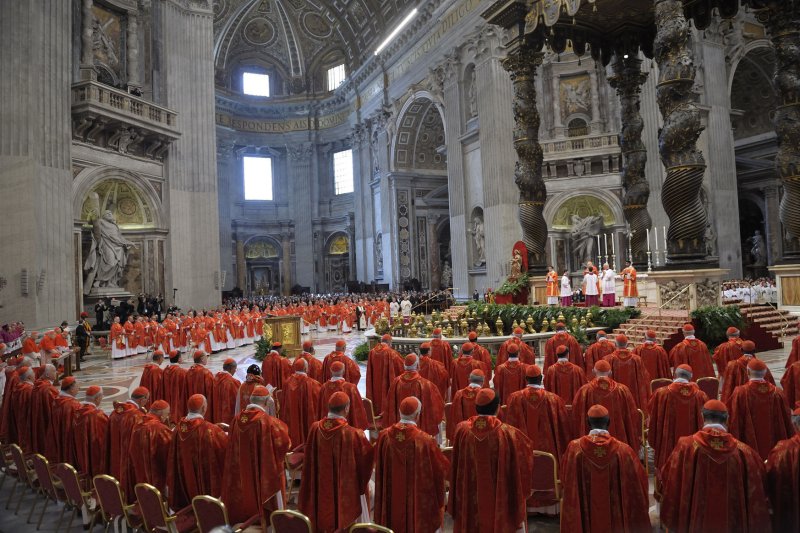Dean of the College of Cardinals Angelo Sodano leads a Mass for the election of a new pope, at the St Peter's basilica on March 12, 2013 at the Vatican. UPI/Stefano Spaziani |
License Photo
FORT MEADE, Md., Oct. 31 (UPI) -- The National Security Agency denied spying on Roman Catholic cardinals in the run-up to the election of Pope Francis, saying an Italian news magazine was wrong.
The spying may have included Argentinean Archbishop Jorge Mario Bergoglio, who was elected pope March 13, Panorama magazine said.
"The National Security Agency does not target the Vatican. Assertions that NSA has targeted the Vatican, published in Italy's Panorama magazine, are not true," the U.S. spy agency said in a statement.
The Vatican's chief spokesman, the Rev. Federico Lombardi, issued a statement before the NSA denial, saying, "We have heard nothing of this and are not worried."
Without citing sources, the weekly magazine based in Milan said the NSA conducted wholesale surveillance on the records of 46 million Italian phone calls in December 2012 and January, much as it has been accused of doing in France and Spain.
The allegation was first reported by Cryptome, a U.S. website that gathers intelligence about freedom of speech, cryptography, spying and surveillance.
But Panorama said the Vatican, which is its own sovereign state, was included in the sweep of Italy.
And the magazine said the NSA went beyond record-collection when it came to the cardinals.
It said the NSA listened in on calls to and from the Vatican, including the phones in the modest Casa Santa Marta guesthouse where Bergoglio and the rest of the College of Cardinals stayed during the conclave.
Bergoglio still lives in the guesthouse.
"It is feared that the great American ear continued to tap prelates' conversations up to the eve of the conclave," Panorama said.
The report said intercepted Vatican calls were placed into one of four categories -- leadership intentions, threats to the financial system, foreign policy objectives and human rights.
Bergoglio was of interest to U.S. diplomats and intelligence agencies as far back as 2005, when he was mentioned as a possible papal successor to John Paul II, a cable released by WikiLeaks three days after Bergoglio's election as pope indicated.
The 2005 cable from the charge d'affaires of the U.S. Embassy to the Holy See said: "Bergoglio exemplifies the virtues of the wise pastor that many voters value. Observers have praised his humility: He has been reluctant to accept honors or hold high office and commutes to work on a bus."















